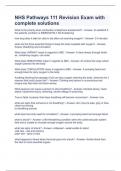Exam (elaborations)
NHS Pathways 111 Revision Exam with complete solutions
- Course
- Institution
What is the priority when conduction a telephone assessment? - Answer- to establish if the patients condition is IMMEDIATELY life-threatening how long does it take for cells to die after not receiving oxygen? - Answer- 3-5 minutes what are the three essential things to keep the body supplied ...
[Show more]



